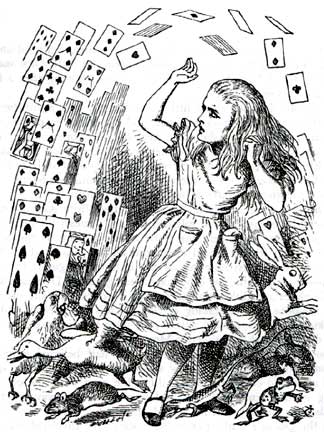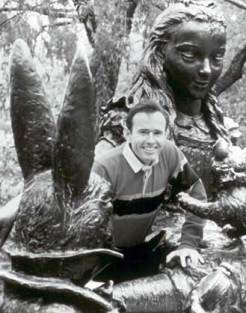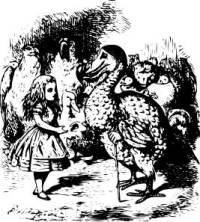By Stephen Brookes • The Washington Post • May 8, 2008
________________________________________________________________________
 It was the most outrageous thing the music establishment could have imagined. Here was Sir Georg Solti leading the Chicago Symphony Orchestra in a new work by a leading avant-garde composer, and there were . . . arias! With actual melodies! Contemporary music, as everyone knew, was supposed to be thorny and atonal stuff, with no use for the outdated conventions of the past. Yet here was bar after bar of lush, unrepentant harmony, hummable tunes, symphonic gestures right out of Mahler. Even a fugue. To the ruling avant-garde it was a slap in the face -- and as a final insult, the audience leapt to its feet, cheering, when the piece came to a close.
It was the most outrageous thing the music establishment could have imagined. Here was Sir Georg Solti leading the Chicago Symphony Orchestra in a new work by a leading avant-garde composer, and there were . . . arias! With actual melodies! Contemporary music, as everyone knew, was supposed to be thorny and atonal stuff, with no use for the outdated conventions of the past. Yet here was bar after bar of lush, unrepentant harmony, hummable tunes, symphonic gestures right out of Mahler. Even a fugue. To the ruling avant-garde it was a slap in the face -- and as a final insult, the audience leapt to its feet, cheering, when the piece came to a close.
It was Oct. 7, 1976, and the work was "Final Alice" by 39-year-old composer David Del Tredici. Until that moment, he'd been a card-carrying member of the avant-garde. But in one bold stroke, Del Tredici jettisoned the strict composing system known as serialism (which dominated new American music, to the despair of most audiences) and embraced a neo-romantic style -- scandalizing his colleagues and setting off an earthquake in American music whose aftershocks are still being felt.
" 'Final Alice' changed the face of music in this country overnight," recalls Leonard Slatkin, the National Symphony Orchestra's music director, who was in the Chicago audience that night. "It destroyed all conceptions of what 'new music' was supposed to be, and many composers will tell you that they were now liberated to write how they felt. It was the start of a revolution."
Slatkin is bringing the complete work to the Kennedy Center for the first time this weekend, and it promises to be a spectacle. A sort of opera in concert form, "Final Alice" is drawn from Lewis Carroll's "Alice's Adventures in Wonderland" and is just as wildly imaginative as the original. Spoken and sung by an amplified soprano (the remarkable Hila Plitmann, in her NSO debut) who at one point sings through a bullhorn, it calls for a gargantuan orchestra augmented by sirens, a theremin and an amplified "folk group" of saxophones, a mandolin, a banjo and an accordion.
"It's a retro piece in the aspects of melody and harmony and rhythm -- literally a return to tonality," Slatkin says. "But the sounds are just insane."
And that's probably appropriate for the plot of "Final Alice," which focuses on the last two chapters of Carroll's book. It tells the story of an edgy, nonsensical trial (someone stole some tarts) that starts out lightheartedly but ratchets steadily into pandemonium, until the Queen shouts "Off with her head!" -- and Alice wakes back in reality.
But it wasn't the story that intrigued Del Tredici as much as the story behind the story. The Alice-in-Wonderland tale, as is well known, was actually written by the Rev. Charles Lutwidge Dodgson, a respected English mathematician and logician. Greatly taken with a young girl named Alice Pleasance Liddell, he made up the tale for her and her sisters, publishing it in 1865 under the pen name Lewis Carroll. With its puns, logic games and engagingly absurd rhymes, the book became a classic of children's literature.

David Del Tredici, in his "Alice" yearsBut there have long been disturbing questions about Dodgson's relationship with Alice Liddell. He clearly was infatuated with the child, and -- while there's no solid evidence that he was a pedophile -- Dodgson was known to be extremely interested in young girls, avidly searching them out, befriending them, even taking nude photographs of them. The Liddell family eventually broke off relations with him, for reasons never fully explained.
And yet, while scholars agree that Dodgson was almost certainly in love with Alice (there's a persistent rumor that he proposed marriage to her in 1863, when she was all of 11), he seems to have repressed any sexual feelings he may have had. "He probably felt more than he dared acknowledge, even to himself," biographer Morton N. Cohen has suggested.
That story of forbidden love caught Del Tredici's imagination.
"What inspired me to do 'Alice' was partly Lewis Carroll, and partly Martin Gardner, who wrote 'The Annotated Alice,' " says the New York-based composer, now 71. Gardner's 1960 book showed that many of Carroll's nonsense verses were based on popular songs of the day, and pointed to secret meanings in the work. Particularly interesting was a love song called "Alice Gray," by William Mee, about a man's unrequited passion for a girl named Alice.
"I wanted to put in the true story of Carroll," Del Tredici says. "His love for Alice, whatever it was. And since these were forbidden poems -- the truth, let's say, about Carroll -- I would set them in the forbidden language, which at that time was, of course, tonality. So in a way I use the tonality in 'Final Alice' as a metaphor -- an image of 'forbiddenness' unveiled."
Metaphor or not, the leap into tonality was a bold move. Composers in the 1970s saw themselves as being in the vanguard of a revolution, forging a new musical language built on the 12-tone system of Arnold Schoenberg. Tonality belonged to the past, and audiences were treated as almost irrelevant. "Who Cares if You Listen?" asked Milton Babbitt, one of the leading serialists of the day, in the title of a celebrated essay.
"It was inconceivable at the time to write tonally," Del Tredici says. "I thought, I cannot do this -- my colleagues will think I'm nuts! But I realized that my instinct had given me these tonal chords with the same excitement it used to give me minor ninths and minor seconds, so I decided to go with my instinct. I went back and finished the piece and hoped for the best."
 And the music is revelatory. The words of the innocent, sweeping aria that opens the work are right from the book. But as the drama unfolds, the singing gets increasingly edgy and tormented. New texts are introduced, the arias swell with anguish, and as the lid is torn from Carroll's secret love, the music explodes. Tempos leap madly around, the theremin wails, sirens shriek, and the soprano hurtles herself against the furthest reaches of her range. From light, amusing children's fantasy, "Final Alice" turns into something much different -- a gripping portrayal of turmoil in the human heart.
And the music is revelatory. The words of the innocent, sweeping aria that opens the work are right from the book. But as the drama unfolds, the singing gets increasingly edgy and tormented. New texts are introduced, the arias swell with anguish, and as the lid is torn from Carroll's secret love, the music explodes. Tempos leap madly around, the theremin wails, sirens shriek, and the soprano hurtles herself against the furthest reaches of her range. From light, amusing children's fantasy, "Final Alice" turns into something much different -- a gripping portrayal of turmoil in the human heart.
The work was a popular triumph, and it shot Del Tredici into the limelight. ("Before 'Final Alice,' I was a respected composer," he says. "After it, I was either loved or hated.") Solti recorded it, and a subsequent commission from Slatkin resulted in 1980's "In Memory of a Summer Day," which won the Pulitzer Prize. A major shift toward tonality had begun in American music, launched almost single-handedly by "Final Alice."
But even as neo-romanticism settled firmly into the American musical mainstream -- marked by such works as Mark Adamo's "Little Women" -- Del Tredici kept pushing at the edges. Like Carroll, he had his own demons, and after winning the Pulitzer he went through what he calls "a kind of personal breakdown" marked by alcoholism and sex addiction. Fighting his way back into balance, he says, changed his identity as a composer.
"Coming out of that breakdown brought me some personal exploration, and that got me into being out about being gay," he says. "I'd always been personally out as a gay man, but to actually make it a public expression of my music -- I would never have done that unless I felt I had somehow crashed and come back."
The result has been a string of works as shocking in their own way as "Final Alice" was -- songs celebrating gay life, often built around pornographic texts by writers such as Allen Ginsberg. It's a controversial path, but Del Tredici says he needs to trust his instincts -- the same ones that brought him so famously to tonality -- even if they result in music considered too outrageous to be widely performed.
"I often get tarred for my passions, but I feel I have no choice: Music is passionate to me," he says. "And music is about passion, no matter how much to the contrary in the 20th century we may have been told."
So he's become a maverick once again?
"Yes!" the composer says, laughing. "In my 70s, I'm still being a bad boy."